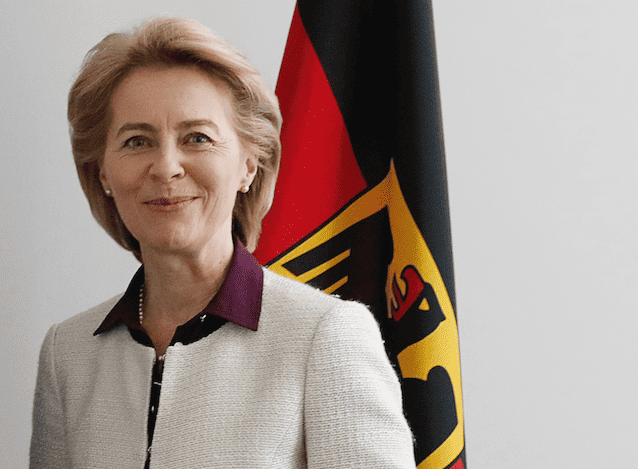German defence minister Ursula von der Leyen has been nominated to be the next president of the European Commission after receiving backing from EU member state leaders.
Von der Leyen’s nomination must now be approved by the European Parliament, and if elected, will succeed Jean Claude Juncker and become the first woman to lead the European Commission.

Ursula von der Leyen
However opposition to the 60-year-old politician’s nomination could still see her nomination, and that of other key posts, rejected by MEPs.
Von der Leyen, who started her career as a medical doctor, emerged as a compromise candidate when Europe’s leaders couldn’t agree on any of the European Parliament’s shortlisted ‘spitzenkandidaten,’ which included Manfred Weber, Frans Timmermans and Margrethe Vestager.
Alongside her in another of of the top EU jobs will be Christine Lagarde, current managing director of the International Monetary Fund, who has been nominated to be the next president of the European Central Bank.
Current interim prime minister of Belgium, Charles Michel is proposed as the new president of the European Council, replacing the outgoing Donald Tusk.
As usual, the nominations have emerged as a results of horse-trading and compromise among member states. The nomination of Ursula von der Leyen, a close ally of Angela Merkel and a committed EU federalist makes her very much a continuity candidate.
This is something which many voters in the recent EU elections opposed, as evidenced by the rise of Green parties and Eurosceptic and nationalist parties, who are calling for a fundamental re-think to existing EU policies.
The Green party bloc in the European Parliament said the deal “fails to respect the lead candidate process and the results of the European elections. We need a political change in Europe.”
Europe’s socialists called the list of names “deeply disappointing” and the group’s leader Iratxe Garcia said it was “unacceptable” that Timmermans and the Spitzenkandidaten system had been overruled.
Von der Leyen has been an outspoken critic of Brexit, describing it as a “burst bubble of hollow promises.” However whoever is named as the new EC president role won’t have a lead role in any forthcoming Brexit talks, as the decision to make further concessions to the UK, or otherwise, rests with the member states.
Implications for pharma
In terms of the impact on healthcare policies and the pharma industry in particular, a key development to watch will be who is appointed to top jobs at the ENVI committee. This oversees Environment, Public Health and Food Safety policies, including regulation of pharma.
The Greens won a great number of seats and will look to secure high profile jobs at the ENVI committee, and are well known for their distrust of the pharma sector.
Europe’s pharma association EFPIA has been careful not to comment on the formation of the new EU leadership, but is continuing to promote its agenda for the next five years.
Yesterday it unveiled its response to a consultation launched by the European Medicines Agency on its Regulatory Science Strategy to 2025.
EFPIA picked out its top three priorities: to foster innovation in clinical trials, diversify and integrate the provision of regulatory advice along the development continuum, and to promote use of high-quality real-world data (RWD) in decision making.
Among other issues it highlighted was the question of better co-ordination of advice between regulatory authorities and HTA bodies.
Efforts to agree legislation to enable this was met with opposition from France and Germany before the EU elections, and could remain stalled in the new administration. EFPIA yesterday called for a ‘refreshed approach’ to the plans, including ensuring that HTA and reimbursement processes would remain distinct.




